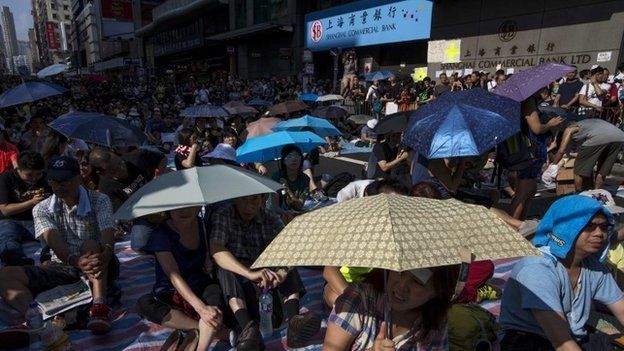Hong Kong protests: What is the impact on tourism?
- Published

The first week in October is a week-long national holiday in China, also known as the Golden Week, which usually ferries in thousands of tourists from the mainland to neighbouring Hong Kong for a getaway.
During this period, cash tills in shops hardly stop ringing as the mainland tourists flock to the international designer labels, snapping up luxury branded goods.
It is a "golden period" for retailers and other businesses, which would generally see a boost to their bottom lines.
But recent events have taken the shine off the beginning of this year's Golden Week.
Since the weekend, tens of thousands of protesters in the Occupy Central movement have stationed themselves in several parts of Hong Kong for pro-democracy rallies in the lead-up to China's National Day, despite a call by Hong Kong leader CY Leung to work with Beijing.
And that could pose a threat to Hong Kong's retail and tourism sectors.
"It is believed that some visitors will postpone or even cancel their plans to visit Hong Kong for the time being," the Hong Kong Tourism Board (HKTB) told the BBC, without giving any details.
"The HKTB has been closely monitoring the development of the movement."
Off peak
Based on the tourism board's records, international visitor arrivals into Hong Kong, including from the mainland, during the Golden Week have been increasing by a minimum of 10% over the last few years.
"Naturally, the protests will put a dent on tourism from the mainland, but bear in mind that in general October is not peak season for mainland visitors to Hong Kong," says David Yang, who covers political and regulatory risks at consultancy firm IHS.
"Golden Week brings a slight bump, but by my estimate it amounts to a modest extra 100,000 to 200,000 visitors."
Mr Yang says the category most likely to be affected are tour groups coming to Hong Kong for overnight stays, who make up about a third of the mainland tourist traffic.
"In a 'normal' year, about 30,000 to 60,000 extra mainland visitors would arrive with tour groups during the Golden Week. According to the Hong Kong Tourism Board, the average overnight visitor spends 8,123 Hong Kong dollars ($1,046; £644) during his or her stay."
He adds that the sectors most likely to be affected are retail, food and drink, and accommodation. "The impact will last for as long as protests continue."
Safety priority
The protesters want China to withdraw plans to vet candidates for the next Hong Kong leadership election in 2017. Their rallies have gathered at the main sites in the Central business district (Connaught Road), Causeway Bay and Mongkok.
Around the corner from the protest area in the city's Central, Lan Kwai Fong (LKF) houses more than 100 bars, restaurants and retailers. The bustling entertainment and shopping district ranks high among the places to visit in Hong Kong and comes alive after sundown.
Allan Zeman, chairman of Lan Kwai Fong Group which manages the district, told the BBC that businesses within LKF generally see a 20% boost to their revenues in the month of October, from the extra tourists flowing through Hong Kong during China's Golden Week.
But that could change this year.
When the protests began, several restaurants and bars decided to close earlier than usual, says Mr Zeman. "Obviously safety is our first priority."
The number of revellers and patrons in the area has dropped by about 15%.
"There will be an impact from the protests, but not too much," he says. That is because even though the number of tour groups may have dropped, they are not the main customers at LKF. Instead, the group's typical customer is "the FIT" (Free Individual Traveller).
Despite the proximity to the protest zones, Mr Zeman is confident there will be no spillover from the demonstrators.
"We are an entertainment and dining district, and we do not anticipate Occupy Central will move into LKF. It is not a political place and we also have a lot of experience dealing with crowds."
Adjusted itineraries
Not everyone is cancelling their planned trip to Hong Kong though.
Curtis Bergh, a Singapore-based businessman from the US, travels to Hong Kong about four times a year, for both business and leisure.
Last week he booked a 10-day trip to Hong Kong starting on 2 October. He is still going ahead with the trip.
"I don't feel it's necessary to cancel my trip as the protests are still quite concentrated in certain areas of Hong Kong and most of my plans and activities are away from the protest zones," he says.
"I've adjusted my itinerary to avoid the protest areas as much as possible. I'll just have to keep an eye out on the situation as it is very fluid, and adjust my movements and plans accordingly."
'Resilient bunch'
While tourism is one area of economic growth for Hong Kong, it is not the main driver.
"More important to Hong Kong are domestic retail spending, banking and finance, and social services," says David Kuo, director at investment advisory firm Motley Fool Singapore.
He says that as the protests have been well contained to parts of Central and Mong Kok, and have generally been promoted as being friendly and good-natured, they "should do little to affect the rest of the country or its position as a place to do business".
And he points out that China, politically, needs Hong Kong more than it would like to admit.
"Hong Kong, with its sound legal framework, freedom of speech and fair judicial system, is and will remain, the acceptable face of China to the outside world."
He adds: "There could be a short-term impact on tourism but it is something that Hong Kong has learnt to weather over the years. Hong Kong people are a resilient bunch."